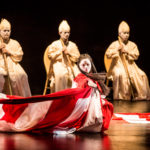
© » KADIST
Subash Thebe Limbu
In Ningwasum , Subash Thebe Limbu explores Adivasi Futurism, a concept he has developed over a number of years, inspired by the writings of Octavia Butler, Afrofuturism, Indigenous Futurism, and various Adivasi, Janajati, feminist, queer, and Dalit movements. The video features an Indigenous, astronaut time traveller from the future, whose Indigenous nation not only co-exists with other nations and allies but also contains advanced technology that would appear magical to those from the present. Filmed mostly in the Himalayas, including the Wasanglung region in Eastern Nepal believed to be the shamanic home of the Yakthung, Ningwasum weaves oral narratives, animations, language, storytelling, soundscapes, and electronic music.

© » KADIST
Subash Thebe Limbu
In Ningwasum , Subash Thebe Limbu explores Adivasi Futurism, a concept he has developed over a number of years, inspired by the writings of Octavia Butler, Afrofuturism, Indigenous Futurism, and various Adivasi, Janajati, feminist, queer, and Dalit movements. The video features an Indigenous, astronaut time traveller from the future, whose Indigenous nation not only co-exists with other nations and allies but also contains advanced technology that would appear magical to those from the present. Filmed mostly in the Himalayas, including the Wasanglung region in Eastern Nepal believed to be the shamanic home of the Yakthung, Ningwasum weaves oral narratives, animations, language, storytelling, soundscapes, and electronic music.

© » KADIST
Subas Tamang
Drawing & Print (Drawing & Print)
Study of History IV by Subas Tamang is an etching and aquatint print based on photographs taken by German photographer Volkmar Wentzel in 1949. Wentzel’s original color photographs document the transportation of a Mercedes Benz, carried on a wood armature by sixty porters, over a rocky trail from Bhimphedi to Kathmandu in Nepal. At the time of Wentzel’s photographs, paved roads in Nepal only existed within the Kathmandu Valley and cars had to be carried into the city from the surrounding hills on foot.

© » KADIST
Subas Tamang
Drawing & Print (Drawing & Print)
Masiniya Matawali by Subas Tamang is an etching and aquatint print based on photographs taken by German photographer Volkmar Wentzel in 1949. Wentzel’s original color photographs document the transportation of a Mercedes Benz, carried on a wood armature by sixty porters, over a rocky trail from Bhimphedi to Kathmandu in Nepal. At the time of Wentzel’s photographs, paved roads in Nepal only existed within the Kathmandu Valley and cars had to be carried into the city from the surrounding hills on foot.

© » KADIST
Subas Tamang
Drawing & Print (Drawing & Print)
Study of History VI by Subas Tamang is an etching and aquatint print based on photographs taken by German photographer Volkmar Wentzel in 1949. Wentzel’s original color photographs document the transportation of a Mercedes Benz, carried on a wood armature by sixty porters, over a rocky trail from Bhimphedi to Kathmandu in Nepal. At the time of Wentzel’s photographs, paved roads in Nepal only existed within the Kathmandu Valley and cars had to be carried into the city from the surrounding hills on foot.

© » KADIST
Subas Tamang
Drawing & Print (Drawing & Print)
Study of History III by Subas Tamang is an etching and aquatint print based on photographs taken by German photographer Volkmar Wentzel in 1949. Wentzel’s original color photographs document the transportation of a Mercedes Benz, carried on a wood armature by sixty porters, over a rocky trail from Bhimphedi to Kathmandu in Nepal. At the time of Wentzel’s photographs, paved roads in Nepal only existed within the Kathmandu Valley and cars had to be carried into the city from the surrounding hills on foot.

© » KADIST
Subas Tamang
Drawing & Print (Drawing & Print)
Study of History V by Subas Tamang is an etching and aquatint print based on photographs taken by German photographer Volkmar Wentzel in 1949. Wentzel’s original color photographs document the transportation of a Mercedes Benz, carried on a wood armature by sixty porters, over a rocky trail from Bhimphedi to Kathmandu in Nepal. At the time of Wentzel’s photographs, paved roads in Nepal only existed within the Kathmandu Valley and cars had to be carried into the city from the surrounding hills on foot.

© » KADIST
Hit Man Gurung
Hit Man Gurung’s series I Have to Feed Myself, My Family and My Country… addresses labor migration, a phenomenon prevalent in South Asian countries like Nepal. The laborers, most of whom are young and middle-aged, come from marginalized and underprivileged backgrounds. They leave their families back in the homeland with the dream of pursuing a better life for themselves and their families.
Subas Tamang
Part of the Indigenous Tamsaling community in Nepal, Subas Tamang comes from a family of traditional stone carvers...
Subash Thebe Limbu
Subash Thebe Limbu considers his works to be science fiction through an Indigenous lens, rooted in the language, script, songs, and symbols of the Yakthung (Limbu) peoples...
Hit Man Gurung
Hit Man Gurung was born in Lamjung, Nepal and is currently based in Kathmandu...

© » ARTS EQUATOR
about 57 months ago (02/16/2021)
A predestined fate: Nine Years Theatre’s Oedipus | ArtsEquator Thinking and Talking about Arts and Culture in Southeast Asia Articles February 16, 2021 By Patricia Tobin (665 words, 4-minute read) The story of Oedipus is undoubtedly known to all...

© » ARTS EQUATOR
about 77 months ago (06/04/2019)
Mad women, divine punishment, and “Dionysus” | ArtsEquator Thinking and Talking about Arts and Culture in Southeast Asia Articles Courtesy of Arts House Limited June 4, 2019 By Corrie Tan (1,700 words, eight-minute read) This review contains spoilers and/or plot points for The Bacchae, a 2,500-year-old ancient Greek tragedy; Beware of Pity, a 1939 German novel adapted for the stage by the Schaubühne Berlin and Complicité; as well as the final season of the fantasy television epic Game of Thrones, which concluded last month after an eight-year run...

© » ARTS EQUATOR
about 80 months ago (03/24/2019)
Weekly Picks: Singapore (25 – 31 March 2019) | ArtsEquator Thinking and Talking about Arts and Culture in Southeast Asia Weekly To Do March 25, 2019 NYFA Conference 2019 – Film Industry 101: How Do I Get My Films Made, *SCAPE, 31 March 3pm For a young filmmaker, the road to making a feature film can be daunting; from securing funding to getting the right team for your film, there are many components to pulling a project together...

© » ARTS EQUATOR
about 82 months ago (01/14/2019)
"Dionysus": Suzuki Tadashi Brings Vengeance to SIFA 2019 | ArtsEquator Thinking and Talking about Arts and Culture in Southeast Asia ArtsEquator Viewpoints Dian P Susilaradeya January 14, 2019 By Kathy Rowland (642 words, three-minute read) Suzuki Tadashi is one of the brand names in the international tour circuit, whose productions have earned critical praise and inspired several generations of audiences...
-
2010-2019
Subas Tamang
Drawing & Print
2018(Drawing & Print) Study of History IV by Subas Tamang is an etching and aquatint print based on photographs taken by German photographer Volkmar Wentzel in 1949...
Subas Tamang
Drawing & Print
2018(Drawing & Print) Study of History III by Subas Tamang is an etching and aquatint print based on photographs taken by German photographer Volkmar Wentzel in 1949...
Subas Tamang
Drawing & Print
2018(Drawing & Print) Study of History V by Subas Tamang is an etching and aquatint print based on photographs taken by German photographer Volkmar Wentzel in 1949...
-
2020-2029
Subas Tamang
Drawing & Print
2020(Drawing & Print) Study of History VI by Subas Tamang is an etching and aquatint print based on photographs taken by German photographer Volkmar Wentzel in 1949...
Subash Thebe Limbu
2021In Ningwasum , Subash Thebe Limbu explores Adivasi Futurism, a concept he has developed over a number of years, inspired by the writings of Octavia Butler, Afrofuturism, Indigenous Futurism, and various Adivasi, Janajati, feminist, queer, and Dalit movements...
Subash Thebe Limbu
2021In Ningwasum , Subash Thebe Limbu explores Adivasi Futurism, a concept he has developed over a number of years, inspired by the writings of Octavia Butler, Afrofuturism, Indigenous Futurism, and various Adivasi, Janajati, feminist, queer, and Dalit movements...
Subas Tamang
Drawing & Print
2021(Drawing & Print) Masiniya Matawali by Subas Tamang is an etching and aquatint print based on photographs taken by German photographer Volkmar Wentzel in 1949...